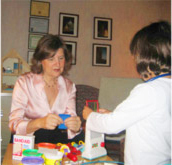Treatment of symptoms of depression, other mood disorders, anxiety, phobias, stress, sexual dysfunctions. Cognitive therapy along with interpersonal therapy has been found to be effective in treating many psychological disorders. If your symptoms are so severe that you are at risk of losing your job, your marriage, or even your life through suicide, medication will probably be a necessary component of treatment. Also, some people are too anxious or too depressed to benefit from psychotherapy. Medication can help these patients make changes in conjunction with psychotherapy. However in most cases, recent research found that antidepressants and psychotherapy are about equally effective. However, the benefits of drug treatment end as soon as the patient stops taking the medication. With psychotherapy, the benefits continue after treatment, preventing future symptoms and improving one’s quality of life. In fact, research studies have shown that after psychotherapy ends, patients continue to improve their satisfaction in life. You might be asking, "What is Cognitive Therapy?" Cognitive therapists help people identify their faulty thinking which promotes the psychological symptoms of depression, anxiety, phobias and other problems in life. By changing faulty thinking to more positive, realistic thinking, symptoms decrease and positive behaviors increase such as experiencing more satisfaction at work and in relationships. Likewise, you might be asking, "What is Interpersonal Therapy?" Interpersonal therapy involves mirroring what is happening in the counseling relationship which could be reflective of what is occurring in one’s relationships in the world. By becoming more aware of how one relates to others and how one’s behavior is experienced by others, relational changes are possible. Symptoms of psychological disorders impact work and social relationships. Psychotherapy provides an opportunity to heal and to relearn how to relate to others in a safe environment. 
Couple and Sex Therapy Couples therapy is an opportunity to strengthen the partnership. For the relationship to thrive there needs to be a desire by both partners to make the relationship work. In the beginning stages of couples therapy, I help partners start to accept each other’s differences and appreciate their individual sensitivities. This kind of understanding often leads to uncoerced changes that are more lasting and more in tune with each partner’s core personality and behaviors. As couples therapy progresses, I assist couples in developing a story about an important relationship problem that incorporates the perspectives of both partners, identifies incompatibilities and vulnerabilities, and then, I describe how each person copes and how the problem escalates into conflict. When the focus in the relationship shifts from offending actions of each partner to the soft spats that are raised by these actions, a new understanding between the partners occurs. It is these revelations that alter the tone of the discussion and the relationship and begin to elicit empathy between the partners. With ongoing couples therapy, tension and sexual incompatability often diminish. Understanding and enhancing sexual expression is an ongoing component of couples therapy. When your partner is unwilling to participate:
If your partner does not want to enter couples therapy with you, there may be some concerns or fears on your partners’ part. I recommend you begin treatment alone. Once your partner sees some positive changes on your part, he/she may feel more comfortable, and might join you. Even if he/she does not join you, you can make significant improvements in your relationship when you attend sessions alone. Separation and Divorce:
I can help you separate amicably if you have already decided to divorce. Research has found that parental conflict, not divorce, is the most important cause of children’s psychological problems. Recommended Reading: - Blakeslee, Sandra and Wallerstein, Judith, Second Chances: Men, Women, and
Children a Second Decade After Divorce. (New York: Houghton Mifflin, 1996). - Christensen, Andrew and Jacobson, Neil S., Reconcilable Differences. (New York: Guilford Press, 1999).
- Wallerstein, Judith and Blakeslee, Sandra, The Good Marriage: How and Why Love Lasts. (New York: Warner Books, 1996).

Children and Adolescents Play Therapy
We can understand children better if we understand their play. Play is the primary way that children:
- Learn about the world
- Understand how things work
- Express themselves
- Develop new physical skills
- Develop social skills and bonds. 

| By watching children play, I can often learn as much about their thoughts, feelings, motivations, and struggles as I can by talking to them. When I evaluate a child or adolescent, I will schedule an appointment with the parents first so I can learn more about their child, including a review of any other health-care evaluations and/or school testing. I will also take a developmental /family history. Next, I will schedule two to four appointments for the child where I will do an assessment. Finally, I will set up another appointment with the parents to review my findings. There may be several options. I may recommend that I continue to see the child. I may refer the child to another professional. I may recommend family therapy with or without the child. I may recommend parenting sessions. Like a fingerprint, each individual and each family is different and requires a customized approach to their particular needs. | 
What Makes Strong Families? Nick Stinnett and John DeFrain published the results of an extensive research project designed to learn more about the characteristics associated with strong families (Secrets of Strong Families, NY: Berkley Books). They identified 3,000 strong families throughout the U.S.A. and conducted extensive interviews with family members. The families represented a true cross-section of the population on many dimensions. Strong families were found to have six primary features in common: - Commitment – family members were committed to their relationships and to helping each member grow as an individual.
- Appreciation – family members frequently told and showed each other that they appreciated each other, and they were able to be specific about the things they expressed.
- Communication – families used good communication skills and they communicated frequently with each other.
- Fun Time Together – strong families made time together a priority, and some of that time was spent doing enjoyable, fun things.
- Spiritual Wellness – whether it was involvement in their own respective religious groups or involvement in inspirational activities such as deep appreciation of nature or music, strong families reported that their spirituality helped them keep perspective on the day- to-day stresses.
- Coping Ability – when these families encountered tough times, they found a way to pull together and support each other rather than being fragmented by crises.

Alcohol/Substance Abuse I provide evaluations to help identify underlying depression or anxiety which may be contributing to the addiction. In addition, I provide relapse prevention counseling for people who are already involved in a 12-step program, counseling for adult children of alcoholics and co-dependency, and family therapy for families in recovery. Peter Steinglass’s The Alcoholic Family describes how alcoholism becomes the central theme around which family life is organized and the profound effects the disease has on family members – both drinkers and non-drinkers. When treating alcoholic family systems, I adhere to Steinglass’s model:
Stage I – Diagnosing Alcoholism and labeling it as a family problem.
Stage II – Removing Alcohol from the Family System.
Stage III – The Emotional Desert – a ‘wet’ alcoholic family that suddenly is ‘dry’ is in a tenuous position. Many families experience this sudden shift as having a sensation of being lost at sea without a rudder. This is because for so many years, the family was organized around the on-again, off-again drinking of the alcoholic family member(s). During this stage, I help the family understand and tolerate these feelings of uncertainty and re-establish a sense of stability that will be achieved without the use of alcohol-related behaviors.
Stage IV – Family Restabilization vs. Family Reorganization – The first outcome of this stage, restabilization, means that alcohol consumption is no longer used but family functioning remains essentially unchanged. At the second outcome in this stage, reorganization is usually precipitated by a crisis. Often, when family reorganization is the goal, this fourth stage tends to be one of couples therapy. Before sobriety, many couples’ interactions were centered on alcohol-related behaviors. Now what? The couple has to relearn healthier ways to express what is on their mind, resolve differences, understand each other’s feelings, manage their anger and renegotiate multiple issues, including power and control. 
Women’s and Men’s Issues Gender-Role Socialization Throughout the ages, men and women have learned to accommodate themselves to certain roles to help the family run better with child-rearing as a predominant goal in families. Many changes (i.e., dual-career couples, gay couples, reclaiming our unrealized potential at age 60 and beyond, single parenthood) have left these previously clear cut decisions in flux. Psychotherapy can help you reevaluate your beliefs about this earlier socialization (i.e., gender-role socialization) and help you find ways to live your life to the fullest. When I refer to gender-roles, I am referring to human characteristics that are specifically assigned to gender, masculine and feminine. For example, according to gender-role definition, nurturing has been considered a feminine attribute while assertiveness has been considered a masculine attribute. These behaviors are thought by some to be evolutionary and are specific parenting behaviors. Therefore, as the qualities that make men perform reliably on various frontiers for protection, so are women urged to develop the qualities that fit them for the role of provider of emotional security. These practices do not permit individuals to enjoy and amplify the full range of psychological possibilities that are potentially within them. According to this theory, women and men can regain externally what they lost internally through mating (i.e., identification with the mate’s characteristics – for men with the woman’s feminine qualities and visa versa). While gender-role training begins early in life, its consequences are not evidenced until the actual onset of marriage. Before child-rearing, despite early gender-role training, young women and men are allowed to indulge in a wide range of psychological potentials. After children come, dedicated parents can never completely relax into self-absorption or self-indulgence. Once the children are launched, however, parents have earned the right to reclaim the parts of themselves that were repressed (i.e., the nurturing and tender qualities for the men and the assertive mastery qualities for the women). At age 60 and beyond, the potentials and pleasures that were relinquished earlier often can be reclaimed. 
Stress Management and Wellness Learning how to balance the demands of life adds to your personal resilience. Getting back to the basics of breathing helps you take back some control in your life. I advocate meditation because it provides you with the ability to see your own mind. The practice of meditation demonstrates compassion for oneself since it involves conscious dedication in time and effort to improving personal well-being. Scientific research done as a result of increased technology has given today’s scientists a view of how meditation (or mindfulness) creates a focus of attention which can reshape the structure of how the brain functions.1 The power of meditation with its “directed mental attention”2 reshapes your neural circuitry and your emotional maps. Specifically, the brain continually refines its processing capabilities to meet the challenges you present it with increasing the communicative power of the neurons and circuits that respond to received inputs or that are tapped for habitual outputs. In other words, meditation (or mindfulness) helps improve your brain’s efficiency by providing the pathways between the neurons and pathways to other neurons. It is the brain’s astonishing power to learn and unlearn, to adapt and to change, to carry with it your experiences that allows you to throw off biological materialism. Thus, the life you lead creates the contents within the brain you have, and meditation becomes the transforming power of the mind to reshape the brain. Through changes in the way you focus your attention, you have the capacity to make choices about what mental direction you will take. Will you experience positive emotions such as love and joy, and/or reduce negative emotions such as fear and anger? When you are intentionally and objectively aware of your thoughts in the present moment, it brings your mental processes under greater voluntary and conscious control. This allows you the experience of greater self-esteem and control at times when you feel you don’t have it in other areas. References: - Roger Walsh and Shauna L. Shapiro, “The Meeting of Meditative Disciplines and Western Psychology.” American Psychologist, April 2006, pp. 229 – 236.
- Jeffrey M. Schwartz, M.D. and Sharon Begley, The Mind and the Brain: Neuroplasticity and the Power of Mental Force. (New York: Regan Books, 2002), p. 254.
- Roger Walsh and Shauna L. Shapiro, pp. 229 – 230.

Career Counseling With globalization and rapid changing technological systems, career distress is commonplace. Finding a good personal fit, balancing work and family needs, and understanding the various stages of your life can also be sorted out in the context of psychotherapy. Managing transitions during career changes can be stressful for you and for your family. Psychotherapy not only helps you manage change, but it helps you take charge of the change and, as Candice Carpenter says in her book, Chapters, it helps you “dance with its rhythms…by living our lives serially, chapter by chapter.” In the process of career exploration, you can reap many benefits besides a new career path. Exploring who you are in the context of your career can help you know your inner self better. When you become more aligned to your inner self, you can build on what you already know about yourself with each transition. Part of this process involves flexibility to survive and even master the rapidly changing world of work. When you form a new relationship to the fast-paced world of work, you open yourself up to its enormous possibilities. If you are thinking about your other career options, if you are an organizational leader who feels your views of the world of work are not keeping pace with the rapidly changing world of work, or if you are just starting out or re-entering the world of work, remember – change is slow, stay with it. You can be who you want to be. 
Eating Disorders Eating disorders are on the rise in our communities with seven million women and girls and one million men and boys reporting symptoms. Sixty percent of our population are reported to be obese. Time magazine reported that as many as 80% of fourth grade girls have already been on a diet. There is not a simple explanation for an eating disorder. Many factors have been identified as factors which contribute to eating disorders. Feelings of inadequacy, depression, anxiety and loneliness. Difficult family and interpersonal relationships may also play a role in the symptoms. Generally, the common thread is that a person is experiencing emotional pain or stress and can not manage these feelings in a healthy way. Often expressing feelings in a healthy way was not modeled in the family so tools to talk about problems and ask for support were not available. At this point, the person began to focus on their body and/or food as a solution to emotional difficulties. The best known treatment to date for symptoms of an eating disorder is a multidiscipinary one using cognitive-behavioral therapy, interpersonal and emotional regulatory approaches in psychotherapy alone with nutritional and psychiatric treatment. Family therapy is also frequently indicated as a way to educate the family and assist them in working supportively with eating disorder symptoms. 
Psychological Trauma and Abuse Psychological trauma occurs to the psyche (one's internal world) as a result of a traumatic event. Damage can be measurable in physical changes inside the brain and in brain chemistry which affects a person's ability to cope with stress. A traumatic incident involves a single experience or enduring, repeated events that completely overwhelm the individual's ability to cope or integrate the ideas and emotions involved with that experience. Typically, causes of psychological trauma are sexual abuse, violence, the treat of either, or the witnessing of either, particularly in childhood. Catastrophic events such as earthquakes and volcanic eruptions, war or other mass violence can also cause psychological traumas. Long-term exposure to situations such as extreme poverty or milder forms of abuse, such as verbal abuse, can also be traumatic. It is noteworthy that different people will react differently to similar events. Play therapy has been found to be effective in treating children who have been traumatized. Play therapy allows children to work through the trauma at their own pace. Learning to use relaxation techniques also is helpful. For adults, once a safe environment has been established, a cognitive framework is developed. One begins to understand how intrusions of the trauma into the psyche and avoidance strategies were used for survival. Techniques are utilized that will put the traumatic event at emotional distance enabling the traumatic event to be put into the larger context of life. A critical element in the treatment is to find words for one's emotional states. Learning to tolerate the painful memories is another critical element of treatment. Cognitive-behavioral and relaxation techniques are also utlized as part of adult treatment. Sometimes medication is a necessary adjunct to treatment. 
Psychological Response to Illness Research (Center for Disease Control, 1980) has shown that 50% of mortalities from the ten leading causes of death in this country can be attributed to behavioral patterns. Psychological interventions have been developed for the treatment of many medical conditions including hypertension, ulcers, headaches, cancers and many others. Illness ranks near the top of the list of life events that brings with them a great deal of stress (Holmes & Rahe, Journal of Psychosomatic Research, 1967). Many people fail to realize the psychological consequences of their health problems. Psychotherapy is an excellent treatment method for people suffering from chronic physical illness. In psychotherapy, one can learn more about the psychological distress created by their physical illness and learn how to turn it into a new committment to life. One can learn also how to change the behavioral patterns that have contributed to and exascerbated the symptoms. As a registered nurse and professional psychologist, I've spent over thirty years helping patients and family members with healing enhancements and ways to manage the problems caused from chronic physical illness. In helping you learn how to increase your personal adaptability to the stressful life event you and your family are facing, you can learn to again live a full and satisfying life. 
Aging Issues Aging is a time for important self reflection. Acknowledging your earlier life history is important if you are to continue to change and grow. Psychological work done on past unresolved issues can be transformational. Yes, it is natural to want to isolate painful incidents that occur and pretend that they don't matter. Overtime, however, this can lead to feeling increasingly out of control, overwhelmed and quilty - all of which makes one less effective in managing the day-to-day stressors in life. The more unresolved parts of the self seek expression, the less it needs to gain attention through self-defeating behaviors. Self awareness helps you gain mastery over your deepest concerns which in turn strengthens your personal adaptablity over the other challenges of aging. Other challenges:  First, there are the problems of a changing body. Sexual needs, for instance, change from being hormonally driven to being more dependent on intimacy and loving kindness. There is a broad spectrum of other concerns from coping with chronic illness to general mental and physical slowing. First, there are the problems of a changing body. Sexual needs, for instance, change from being hormonally driven to being more dependent on intimacy and loving kindness. There is a broad spectrum of other concerns from coping with chronic illness to general mental and physical slowing.
 Secondly, there is the loss of power and control that arises from age-related decisions such as whether to move to a smaller home or to retire. Secondly, there is the loss of power and control that arises from age-related decisions such as whether to move to a smaller home or to retire.
 Thirdly, while in many Eastern cultures later adulthood is regarded as a period of slowing down to contemplate God and the universe, in Western cultures most become more focoused on activity and engaging the body and mind. The challenge is to strike a balance which pleases and satisfies you. Thirdly, while in many Eastern cultures later adulthood is regarded as a period of slowing down to contemplate God and the universe, in Western cultures most become more focoused on activity and engaging the body and mind. The challenge is to strike a balance which pleases and satisfies you.
 Fourthly, relationships start to change. There are frequently the loss of friends, partners, and quite possibly, the children who were expected to be immortal. Their deaths provide huge amounts of psychological stress. Along with these losses comes wonderment about the value of life. Fourthly, relationships start to change. There are frequently the loss of friends, partners, and quite possibly, the children who were expected to be immortal. Their deaths provide huge amounts of psychological stress. Along with these losses comes wonderment about the value of life.
 Lastly, coming to terms with the negative stereotypes of aging is necessary in order to maintain the self esteem necessary to adapt to these challenges. These negative stereotypes about aging has caused fear of aging, and negative or hostile attitudes between different age groups. Lastly, coming to terms with the negative stereotypes of aging is necessary in order to maintain the self esteem necessary to adapt to these challenges. These negative stereotypes about aging has caused fear of aging, and negative or hostile attitudes between different age groups.

| |




